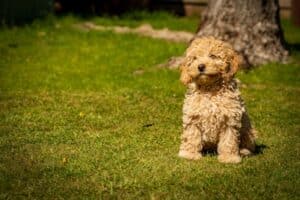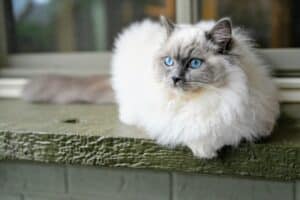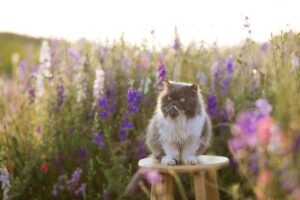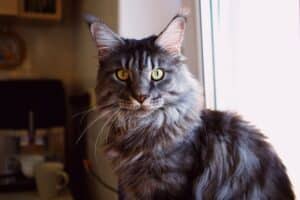Explore the best pets for elderly people, from dog breeds to low-maintenance feline alternatives, plus practical advice on choosing your perfect retirement companion.
The Best Pets for the Elderly

The Best Pets for the Elderly
What Are the Best Pets for the Elderly? Choosing the Right Companion for Your Golden Years
As we get older and move into retirement, this can lead to spending more time alone – whether you’ve sadly lost a partner or you miss the social aspect that your workplace used to offer. Many consider bringing home a four-legged friend during this time, but if you’re unsure if it’s the right choice, help is on hand.
Searching for the best pets for the elderly can be challenging, especially when it comes to finding old people dogs or other companions after years of independent living. We’ll give you everything you need to know before deciding whether to adopt a furry friend in your later years.
What are the benefits of pets for the elderly?
There are countless reasons why welcoming a pet into your home can enhance your quality of life as you get older:
- Companionship – For those who’ve lost a spouse or live far from family members, feelings of loneliness and isolation can become overwhelming. A loyal pet provides constant companionship and can help bridge that emotional gap, offering unconditional love and comfort throughout your daily routine.
- Stress relief – Spending time with animals naturally boosts the production of feel-good chemicals like serotonin and dopamine while reducing cortisol levels (known as the ‘stress hormone’). This helps to ease feelings of anxiety and create a more relaxed mental state.
- Improved mood – Pets offer a powerful antidote to depression by giving you a sense of purpose and routine. Having an animal who depends on you for food and other care provides motivation to get out of bed each day.
- Social interaction – Whether you’re talking to fellow dog owners on a walk or visiting pet-friendly venues, animals naturally improve your social life by opening doors to new friendships and conversations with like-minded people in your community.
- Enjoyment – The entertainment that pets bring can transform your day-to-day life. Their playful behaviour, affectionate nature, and unique personalities bring fun and laughter to your home, helping you feel more energetic.
- Physical activity – Caring for a pet naturally incorporates movement into your routine. Whether it’s daily walks with a dog or playing with a cat, pets encourage you to stay more physically active.
- Cognitive function – Pet ownership involves daily planning, such as remembering feeding times and giving your pet a sense of routine, all of which helps keep your mind sharp, which can help to combat health conditions like Dementia and Alzheimer’s.
Considerations before bringing home a pet
While pet ownership has lots of benefits, welcoming an animal into your home is a significant commitment that deserves careful consideration. Here are some of the key areas you’ll need to think about:
1. Budget
Taking on a pet is a big financial commitment beyond the initial adoption fee. In the UK, you can expect to spend approximately £2,000 per year on a dog, while cats typically cost around £1,590 annually. These figures include monthly essentials like food, litter, grooming supplies, and treats, plus regular expenses such as veterinary check-ups and vaccinations. However, these aren’t the only costs to consider. You’ll also need to budget for unexpected medical emergencies, which can easily run into hundreds or even thousands of pounds. If you’re already finding it challenging to balance living costs with your pension income, adding a pet to your household might not be financially viable right now. That doesn’t mean you have to miss out on the joys of animal companionship entirely. You might want to consider alternatives, like dog walking for elderly owners in your area, or offering occasional pet-sitting services for family members or neighbours.
2. Mobility
Your physical capabilities play a crucial role in determining whether pet ownership is right for you. Dogs, in particular, need a lot of daily exercise – typically at least one hour-long walk each day, with some breeds needing twice that amount. You’ll need to weigh up whether you can comfortably walk for extended periods while keeping control of your pet. If navigating stairs has become difficult, this adds another layer to think about when choosing a pet. An older, calmer animal might be the perfect option, as they tend to be more relaxed and won’t rush around the house, reducing the risk of falls or being knocked over. This way, you can move through your home at a comfortable pace, using a stair-free alternative like a home lift to safely travel between floors. Even cats come with their own physical demands. Regular grooming is essential for most breeds, and professional cat grooming services are rare throughout the UK. This means you’ll likely need to brush your cat regularly to avoid matting and may occasionally need to carefully trim out stubborn tangles. If you’re managing conditions like Parkinson’s or Arthritis, these tasks can be trickier than you’d expect.
3. Lifestyle
Your daily routine and lifestyle preferences will also influence your pet choice. If you’re someone who loves regular holidays or spends long periods away from home, a pet might not be the best fit. Most animals thrive on routine and companionship, and can develop separation anxiety when left alone frequently. Your lifestyle can also help determine the ideal type of pet for you. If you enjoy daily walks and outdoor activities, an active dog could become the perfect walking companion. On the other hand, if you prefer spending quiet time at home reading or watching television, a lap cat might be more suitable.
The 10 best dog breeds for seniors
When choosing a canine companion in your twilight years, older adults tend to benefit from breeds that offer loyalty and companionship without overwhelming energy levels. Here are the 10 best dog breeds for an elderly woman or man that won’t wear you out:
1. Shih Tzu

Originally bred as palace companions, Shih Tzus are gentle, friendly dogs that thrive on human companionship. Their small size makes them easy to handle, while their calm temperament means they’re content with 2-3 half-hour walks each day. They’re a good choice for people who appreciate a loyal companion that doesn’t need extensive training or lots of exercise.
2. Pug
Image source: Mark Mingle via Unsplash
Pugs are sociable dogs with a great temperament. Their sturdy build makes them less fragile than some other small breeds, while their moderate exercise needs (30-60 minutes of walking per day) suit those who enjoy walks but don’t want an overly energetic pet. If you’re considering a pug, it’s important to choose a dog that hasn’t been bred with the stereotypical ‘flat face’ that has become characteristic of the breed, as this can lead to breathing difficulties and higher insurance and vet fees.
3. French Bulldog

French Bulldogs, or “Frenchies,” are compact, muscular dogs with calm personalities. They require minimal grooming and around 30-60 minutes of exercise daily, making them an excellent choice for anyone who wants a low-maintenance companion. Their quiet nature means they won’t disturb neighbours, while their protective instincts provide a sense of security.
4. Maltese

Despite their elegant appearance, Maltese dogs are surprisingly hardy and adaptable. They’re devoted to their owners and content with indoor activities, though they enjoy short walks. Their small size makes them perfect for older adults living in flats or smaller homes, and their gentle nature suits those who prefer quieter companionship.
5. Cavalier King Charles Spaniel

While spaniels have a reputation for being filled with energy, Cavalier King Charles’s are renowned for their sweet, gentle temperaments. They’re equally happy lounging at home or accompanying their owners on short walks. Plus, their friendly nature makes them excellent for people who enjoy social interaction, as they naturally attract positive attention from other dog lovers.
6. Bichon Frisé

Bichon Frisés are cheerful, gentle dogs with hypoallergenic coats that rarely shed – meaning there’s less mess to clean up. They’re intelligent and trainable, making them suitable for anyone who enjoys teaching their pets new tricks or commands. Their moderate size and adaptable exercise needs also make them excellent apartment companions.
7. Havanese

Cuba’s national dog, the Havanese, is known for its gentle nature. They’re content with 30 minutes of exercise each day and are particularly good for those who appreciate a dog that can be both playful and calm. Their silk-like coat requires regular brushing, but their loving temperament makes the grooming time worthwhile.
8. Poodle

Image source: Nick Fewings via Unsplash
Available in three sizes (toy, miniature, and standard), Poodles are trainable dogs with hypoallergenic coats. Toy and Miniature Poodles are particularly great choices for the elderly, offering the breed’s famous intelligence in a more manageable size. Their love for training and interactive play makes them fantastic for those with cognitive conditions, helping to focus the mind.
9. Miniature Schnauzer

These spirited little dogs are alert and loyal without being overly energetic. They’re excellent watchdogs and form strong bonds with their owners. Their moderate grooming needs and adaptable exercise requirements make them ideal for those who want a companion with a bit more personality and presence.
10. West Highland Terrier

Westies are confident, friendly dogs with manageable grooming needs. They’re sturdy enough to handle a bit of rough play while being small enough for easy handling. Their independent yet affectionate nature appeals to anyone who appreciate a dog with character that doesn’t require constant attention.
The top cat breeds for older adults
While dogs may be man’s best friend, there are plenty of options for those who prefer feline companionship:
1. Ragdoll

Ragdolls are pretty cats that are famous for their docile, relaxed temperaments and tendency to go limp when picked up – hence their name. These large, fluffy cats are exceptionally gentle and are known for being patient, making them perfect for older adults who want a calm, affectionate companion. They’re content to follow their owners around the house and have a reputation for being ‘velcro cats’ due to being especially attached to one person.
2. Persian

Persian cats are the epitome of lap cats, with their luxurious, long coats and calm, gentle personalities. They prefer quiet environments and are happy spending their days lounging in comfortable spots around the home. While their coats require regular brushing, many owners find this routine relaxing. Their low energy levels make them ideal for less active households.
3. British Shorthair

British Shorthairs are sturdy, good-natured cats with calm temperaments. They’re independent enough not to be clingy but affectionate enough to provide companionship when wanted. Their short coats require minimal grooming, and their patient, easygoing nature makes them excellent for older adults who want a low-maintenance but loving pet.
4. Russian Blue

Russian Blues are gentle, quiet cats that form strong bonds with their owners while looking regal and elegant. They’re naturally clean and well-behaved, rarely causing havoc or being destructive. Their beautiful silver-blue coats are relatively low-maintenance, and they’re known for being particularly sensitive to their owners’ moods, providing comfort when needed most.
5. Maine Coon

Despite being one of the largest domestic cat breeds, Maine Coons are known as “gentle giants” with dog-like personalities. They’re sociable and enjoy following their owners around, providing companionship without being too demanding. Their friendly nature makes them excellent for older adults who enjoy having visitors, as Maine Coons tend to welcome all guests with the same affection they show their owners.
Other pets for elderly people
Sometimes a dog or cat might not be the right fit for your circumstances; perhaps you can’t commit to their daily care needs, or you’re looking for a companion with lower energy requirements. This doesn’t mean you have to abandon the idea of pet ownership entirely. There are plenty of other animals that provide companionship while being more suited to your specific situation:
- Birds – Budgerigars, canaries, and cockatiels make great, low-maintenance companions that don’t require walks. They need only basic daily care of food, water, and social interaction.
- Fish – Aquariums require minimal daily care beyond feeding and occasional tank-cleaning (which can be tricky if you struggle with detailed hand movements). Watching colourful fish swim by can be calming and therapeutic, which helps to relieve stress.
- Guinea pigs – These gentle creatures are perfect for hands-on interaction without being too demanding. They’re calm and rarely bite. Daily care involves hay, fresh vegetables, and attention, making them manageable even for those with limited mobility.
- Rabbits – House rabbits make quiet, clean companions that can be litter-trained and enjoy petting. They’re happy to hop around in an enclosed space, requiring daily hay, vegetables, and some exercise space.
- Tortoises – If you’re looking for a truly low-maintenance pet, tortoises live for decades and need feeding only every few days. They’re fascinating to observe, completely silent, and their slow movements can be calming to watch.
- Chinchillas – These feather-soft little animals very rarely bite and are naturally quiet, making them great for older adults looking for something a bit different. They’re most active in the evening and need to be given a bowl of Chinchilla dust to bathe in every few days.
Frequently asked questions
Should I adopt an older pet or a younger one?
For most older adults, adopting a senior pet (typically 5+ years for dogs, 7+ years for cats) is usually the better choice. Older animals have established temperaments, require less training, and are generally calmer than their younger counterparts. They’re also less likely to have destructive behaviours and often want companionship and comfort. Senior pets also tend to be overlooked in shelters, so you’ll be giving a deserving animal a home for their golden years.
What happens to my pet if I become unable to care for them?
It’s essential to plan for your pet’s future care if your financial or physical situation changes. Start by speaking to your family members or friends to establish who would be willing and able to take over your pet’s care if needed.
Many animal charities, like The Cinnamon Trust also offer rehoming services and both long and short-term petcare specifically for elderly owners who can no longer care for their pets, so it’s a good idea to do some research into local options well in advance.
Should I get pet insurance, and when?
Pet insurance can be a life-saver when covering unexpected vet bills, which can be more common as pets age. It’s best to sign up for insurance when your pet is young and healthy, as pre-existing conditions are typically excluded.
However, even if you’re adopting an older pet, insurance can still be worthwhile for accidents and new health issues. Make sure you compare the different policies carefully, as coverage can vary significantly between providers.
Which pets are the most low maintenance?
Fish are generally considered the most low-maintenance pets, since they only need to be fed daily and occasionally have the tank cleaned. Some smaller birds, like budgerigars, are also fairly easy to look after, needing daily food and water plus some social interaction.
Keep up with your pets with Stiltz
Getting a pet can bring real joy and companionship to your later years. Whether it’s a gentle lap cat or a dog that loves daily walks, you’ll want to move around your home comfortably together.
If you’re looking for a way to navigate between floors safely, our Stiltz Home Lifts are just the thing. Explore the wheelchair-friendly Trio and standard Duo models today.
Contact us for more information, or browse our blog for inspiration and advice on ageing in place.
Customer Testimonials
My experience with Stiltz Homelifts. Just over a month ago, I had my Stiltz lift installed and I am so pleased with it. The workmen that came and fitted it were very professional and knew what they were doing. They were so professional I would not hesitate to recommend Stiltz lifts to anybody.
Excellent from beginning to end – and beyond.
Everybody we dealt with at Stiltz was very helpful and efficient, from the initial meeting with Nick Sale, the sales rep, thorough technical inspection, the builders, installers, plumber, electrician, and excellent follow up service and attention. My husband’s life is transformed and mine is much easier. Thank you Stiltz.
An excellent company from the first contact to the completed project. All personnel were friendly and very polite but stayed extremely professional throughout. Having been in the construction industry for over 40 years I was aware the preparation work was carried out to a high standard by the best of trades people. The lift itself can not be faulted both the operation and aesthetics.
The service was better than 1st class. It was excellent in every way. We could not be more pleased with everything Stiltz applied it’s self to in any way. We would award 6 stars at the very least.
Suggested Articles
Five Reasons Why Home Lifts Are Better Than Stairlifts
Home lifts are a modern alternative to stairlifts, offering reliability, speed, capacity, and seamless aesthetic integration for a stylish and efficient solution.
What Happens If There Is A Power Cut And I Am In The Home Lift?
Power cuts can be unpredictable. Here’s what you need to know about using your home lift when the lights go out.
Accessible Living: Adaptations to Make Your Home Wheelchair-Friendly
Transform your home into a wheelchair-accessible space with our list of wheelchair-friendly adaptations.







